How Capital Pride went from a block party in 1975 to welcoming the vice president
Seeing Kamala Harris take part in DC Pride ‘was an acknowledgement of how far the community has come,’ former Capital Pride Alliance president tells Gustaf Kilander


Ten minutes before the first annual edition of Capital Pride was set to begin in 1975, 20th Street in northwest Washington DC was almost empty.
But Deacon Maccubbin, the founder of the LGBT+ bookstore Lambda Rising who organised the event, told one of his colleagues not to worry.
“Don’t worry, they’re on gay time, they’ll be here,” he recalls saying at the time.
“And sure enough at 2 o’clock, there were about 2,000 people in the street,” Mr Maccubbin tells The Independent with a laugh.
Before starting Capital Pride, Mr Maccubbin had been travelling to New York City each year to attend the celebrations there.
Pride commemorates the Stonewall riots, also known as the Stonewall Uprising, which took place in Manhattan at the Stonewall Inn between 28 June and 3 July 1969, when members of the LGBT+ community launched protests in response to a police raid in the early morning of the 28th. Patrons of gay and lesbian bars in Greenwich Village decided to fight back when law enforcement became violent.
The riots are now seen as an era-defining moment for the gay rights movement. The following year, the first Pride march took place in the city.
In 1975, “a couple of months before June, we were sitting around at home with a bunch of friends and having a little party and we’re talking about going to New York for Pride,” Mr Maccubbin says. “And somebody… said ‘Why don’t we have something here in DC?’ It was like a light bulb went off in my brain. Like, why not? That makes perfectly logical sense to me. The very next morning, I was scrambling around finding somebody to help me put together a Pride event.”
It was also in New York that Mr Maccubbin first had the idea to open an LGBT+ bookstore in the nation’s capital. After unsuccessful ventures to the local bookstores and libraries looking for gay literature, Mr Maccubin came across the Oscar Wilde bookshop in New York in 1972.
Thinking that Washington should have something similar, Mr Maccubbin took the plunge two years later.
“I had a tobacco shop on one half of a townhouse building in DC, and the other half of that building became vacant,” Mr Maccubbin says about the time leading up to the 1974 launch of Lambda Rising.

Mr Maccubbin, now retired, recalls that during its 35 years in operation, the shop and its staff had “our share of challenges – no question about it”.
The windows were smashed “more than once,” there were bomb threats, and people would “come running through the store” and throw things around.
But the staff of Lambda Rising “persevered… we fought back every time”.
Mr Maccubbin “knew that we were going to be successful” about two weeks after opening Lambda Rising when a man came in, looked around, and said, “Home at last”.
Mr Maccubbin remembers one day when a father brought his son to the store. “His son had not come out to him yet, but he was sure he was gay. And he said he wanted to make sure that he knew it was okay. And he thanked us for being there for that very purpose … That happened all the time.”
Capital Pride was initially promoted through the bookstore, the Washington Blade LGBT+ newspaper and flyers put up around the community.
“The first hurdle that we had to get over was in order to do a block party, you had to close the streets and to close the streets, you had to get the signatures of the people who live on the street,” Mr Maccubbin remembers. “So we were going door to door telling people that we want to do a gay party and we didn’t know whether we’d be able to get the signatures or not … But I’m glad to say that, within a couple of weeks, we had only been turned down once.”
“There were people that were closeted, that were a little worried about coming, but many of them came anyway,” he says. “When the press and media were there, particularly the TV cameras, we told them that they could film on the left side of the street, but not on the right side of the street. And then we’d tell the crowd from the stage – ‘If you want to be on TV, go to the left. And if you don’t want to be on TV, go to the right.’”
“It was amazingly successful for the first year. And then we did it for a total of five years. By the time we got to the fifth year, there were 10,000 people who came. And it was too big for the area that we had to do it. And that’s at the point where I turned it over to another nonprofit foundation and they moved to a different location that could hold more people,” he recalls.
When asked why Pride grew so fast in the District, Mr Maccubbin says, “There’s nothing unique about DC. The same thing happens for Pride everywhere it goes … It grows and grows from year to year. People become more comfortable”.
“It’s kind of hard to describe. It’s like suddenly you’re in. You spend your whole life maybe being in the closet … and then suddenly, you’re in the middle of a crowd of hundreds or thousands of people who are just like you … it’s a freeing experience,” he adds.
“In the early days, it was more of a block party. Now it’s a big celebration, a big festival. So there are a lot of differences. It’s also much more corporate … a lot of major corporations participate in Pride every year and provide a lot of the funding,” he notes.
Mr Maccubbin says that in those early years, they would only make money from the sale of beers and sodas, funds which they would deposit in the bank for next year’s event.
The P Street Festival Committee took over planning for the event from Mr Maccubbin in 1980. Until that year, it had been known as Gay Pride Day, but in 1981 it changed the name to Gay and Lesbian Pride Day.
Following financial difficulties, the non-profit One in Ten took over the planning of Pride in 1995, moving it from Francis Junior High to Freedom Plaza near the White House.
Two years later, the Whitman-Walker Clinic became a co-sponsor to relieve some of the organisational and financial struggles of running the event. It was also in 1997 that the event was renamed to its current moniker – Capital Pride.
In 1998, the event raked in $80,000 in corporate sponsorship, rising to $247,000 the next year.
In 2000, the clinic became the only co-sponsor of Pride in the city and the festival was moved again to Pennsylvania Avenue with the US Capitol in the background of the main stage, where it’s still organised today.
By the time 2004 rolled around, 100,000 people attended events organised as part of Capital Pride.
At least 600,000 people attended the Capital Pride parade and festival over the weekend of 10 and 11 June of this year, according to the Washington Blade.
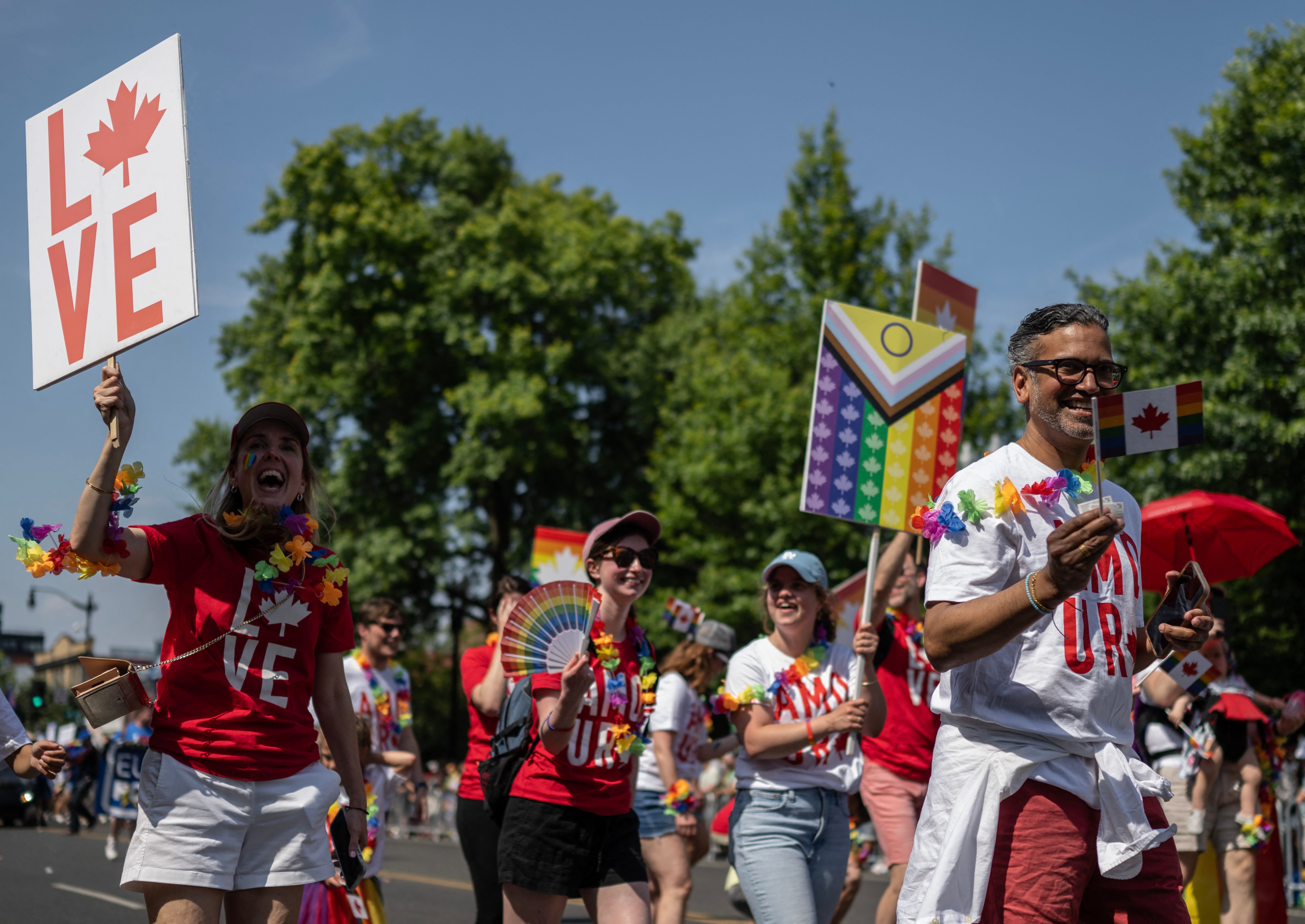
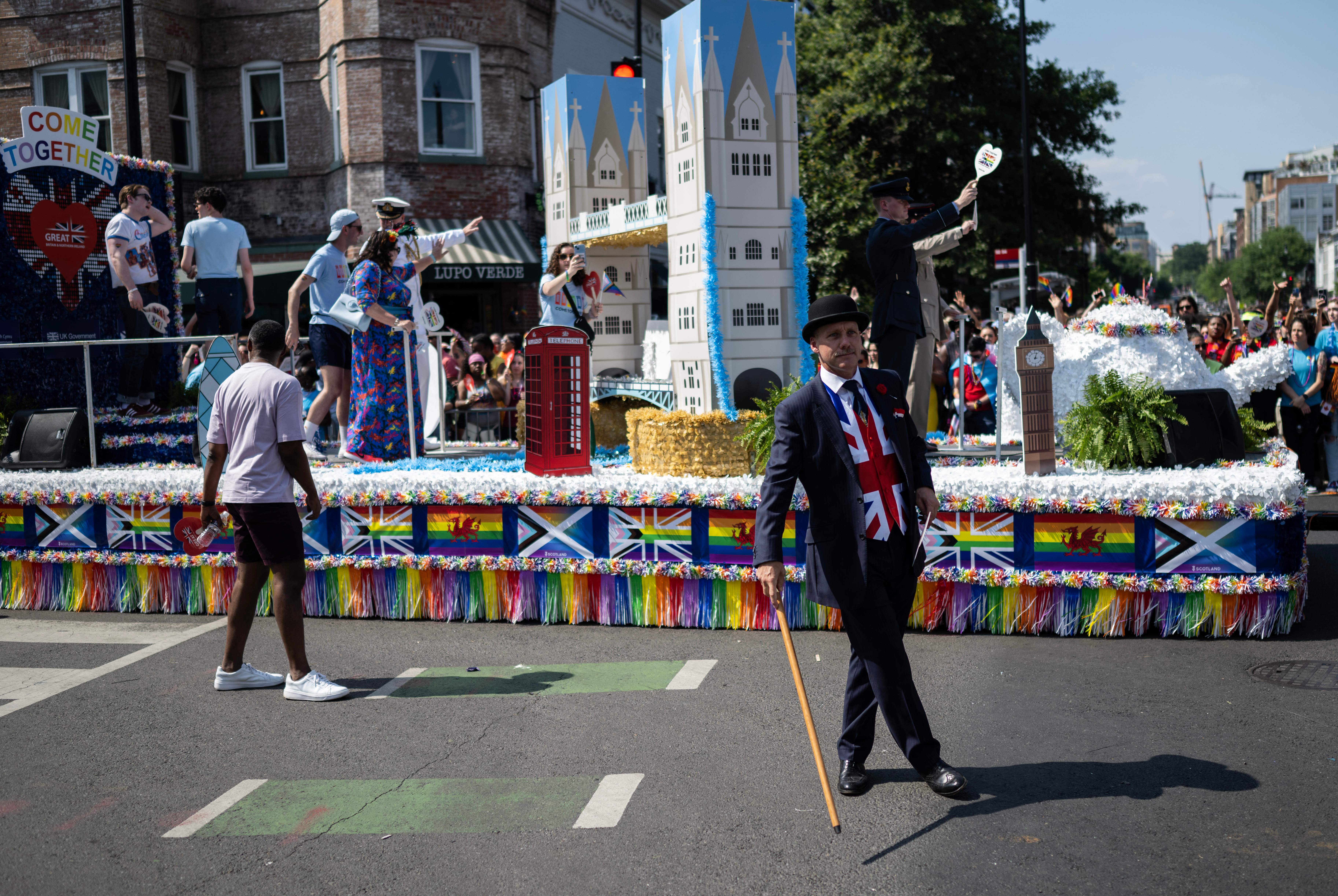
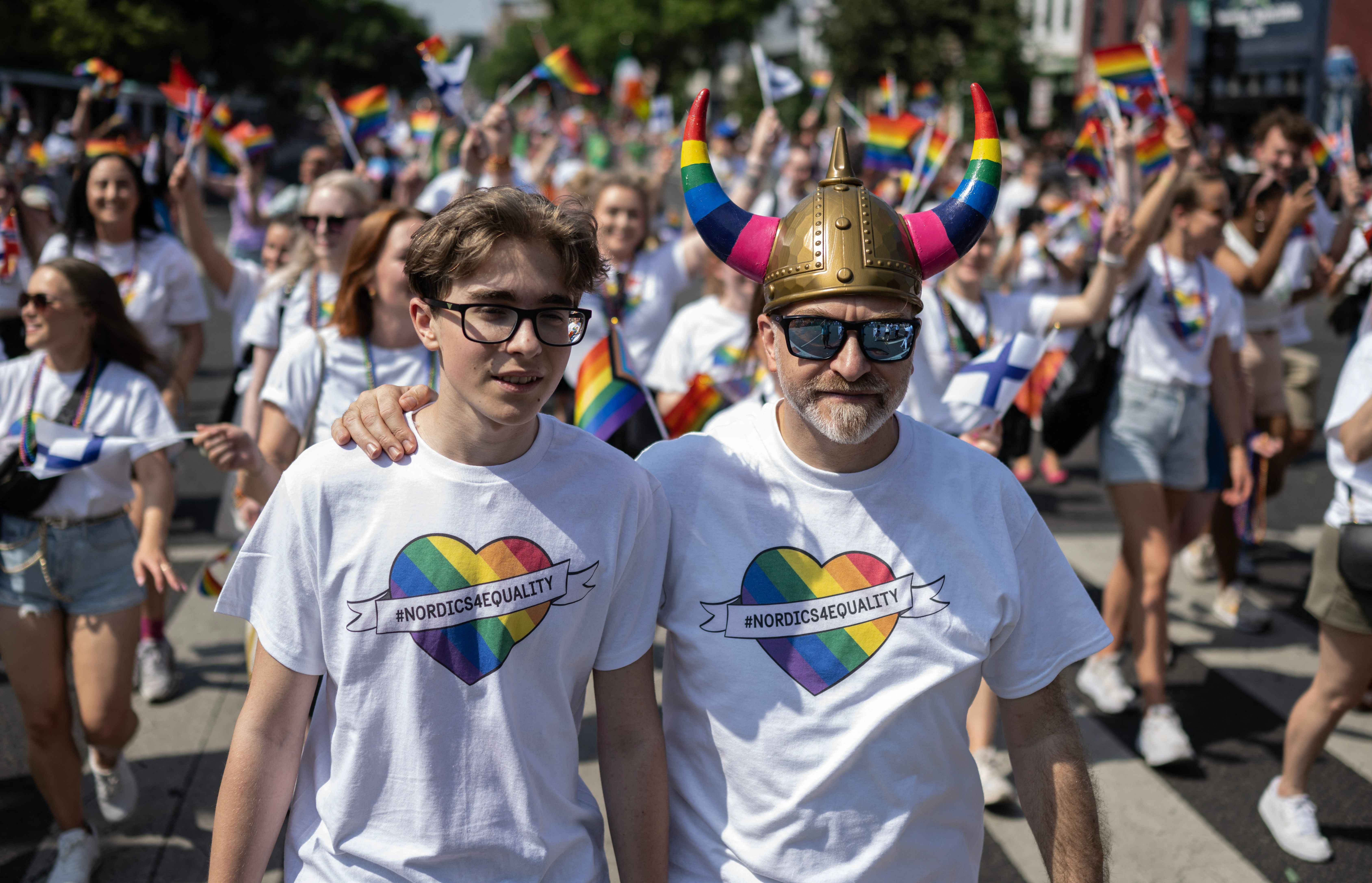
The financial ailments continued and in 2008, the clinic handed over the production rights to the Capital Pride Alliance which was made up of volunteers and groups created by members of the Capital Pride Planning Committee.
Bernie Delia, an attorney at the Department of Justice, was a founding member of the organisation and served as its president between 2011 and 2017.
“Going back to that time, it doesn’t surprise me that there wasn’t” a Pride celebration in DC before 1975, Mr Delia tells The Independent.
“There’s was a great deal of fear about being openly gay, especially here in Washington, DC. My first Pride celebration was 1986 and I remember at that time that people were … still concerned about being identified as a member of the LGBTQ+ community,” he says. “Here in Washington, a lot of folks who work for the federal government … were afraid that their security clearances would be yanked.”

Raised on Long Island, Mr Delia went to college in Maryland not far from DC before going to law school in Texas. He served as a clerk for one of the judges in the Virgin Islands before moving to DC in 1982. “I had probably long known that I was gay. But I didn’t fully embrace that until 1985. And then once I did, I jumped into the community with both feet.”
By the time when Mr Delia attended his first Pride celebration at the age of 30, the AIDS crisis “overshadowed everything that we that we did”.
“We were losing so many people,” he says. “It was at around the same time that I was getting ready to come out that the AIDS crisis really hit and hit very hard.”
Mr Delia was a political appointee in the Clinton administration in the 1990s, working briefly in the White House before moving on to the Department of Justice.
“Bill Clinton was very open and welcoming to members of the community – he certainly set that tone. I worked for many years over at the Justice Department when Janet Reno was the attorney general. And she’s the one who ... got rid of the problems with the security clearances for LGBTQ+ people,” Mr Delia recalls.
But the attorney also says that “there were limits … things have evolved quite tremendously”.
“In 1994, they were assembling the openly gay and lesbian members of the administration, all the political appointees. We were at an event for the holidays, and there were about 25 or 30 people who were there.
“Out magazine attended that event, and they wanted to take a picture of folks. Only 10 people volunteered to be in that picture. Because the rest of the folks were, even though they were openly LGBTQ+, they’ve been appointed into the administration, everybody knew who they were, they still were too concerned to be in that photograph.”
Kamala Harris became the first vice president to attend Capital Pride in 2021 and again last year.
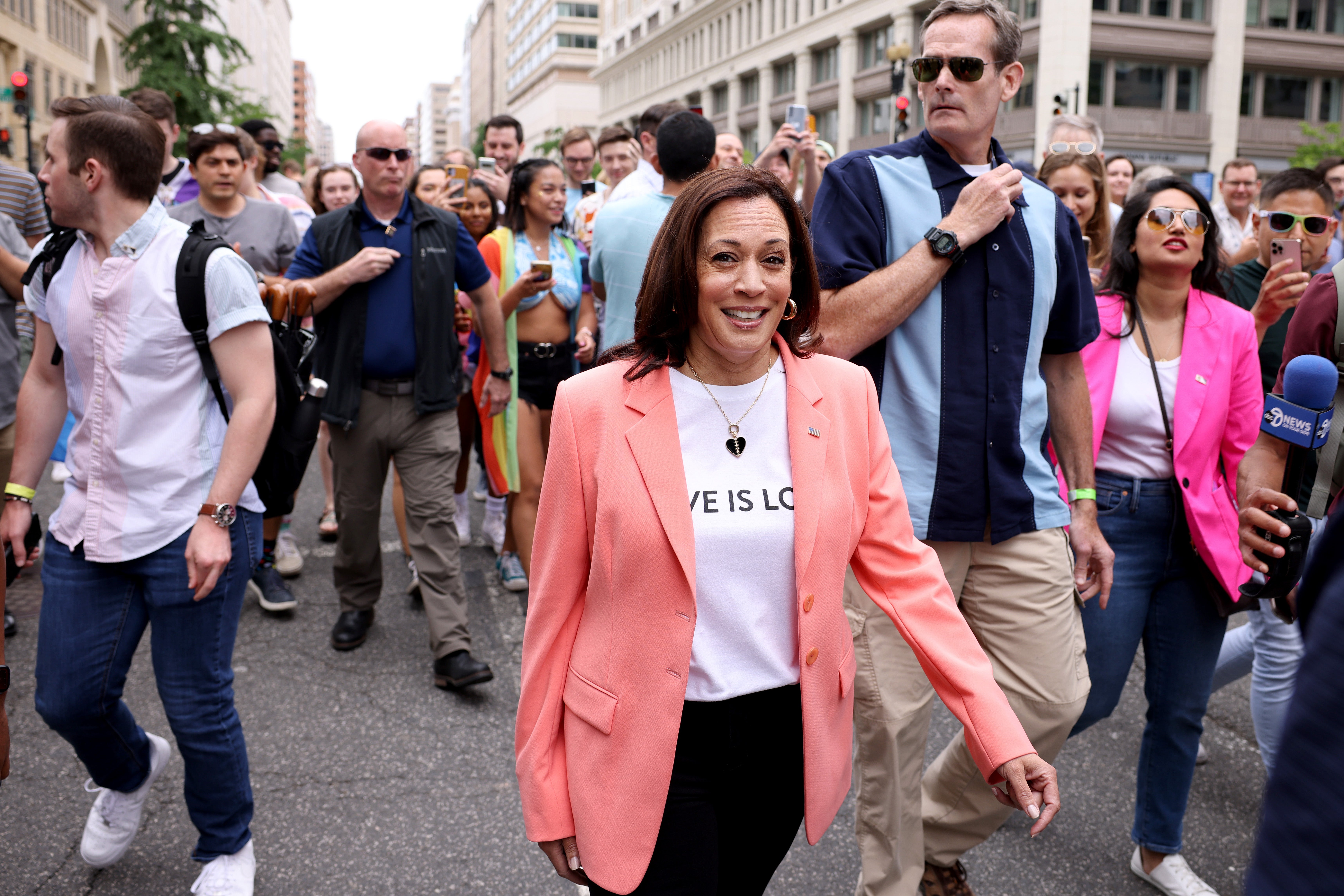
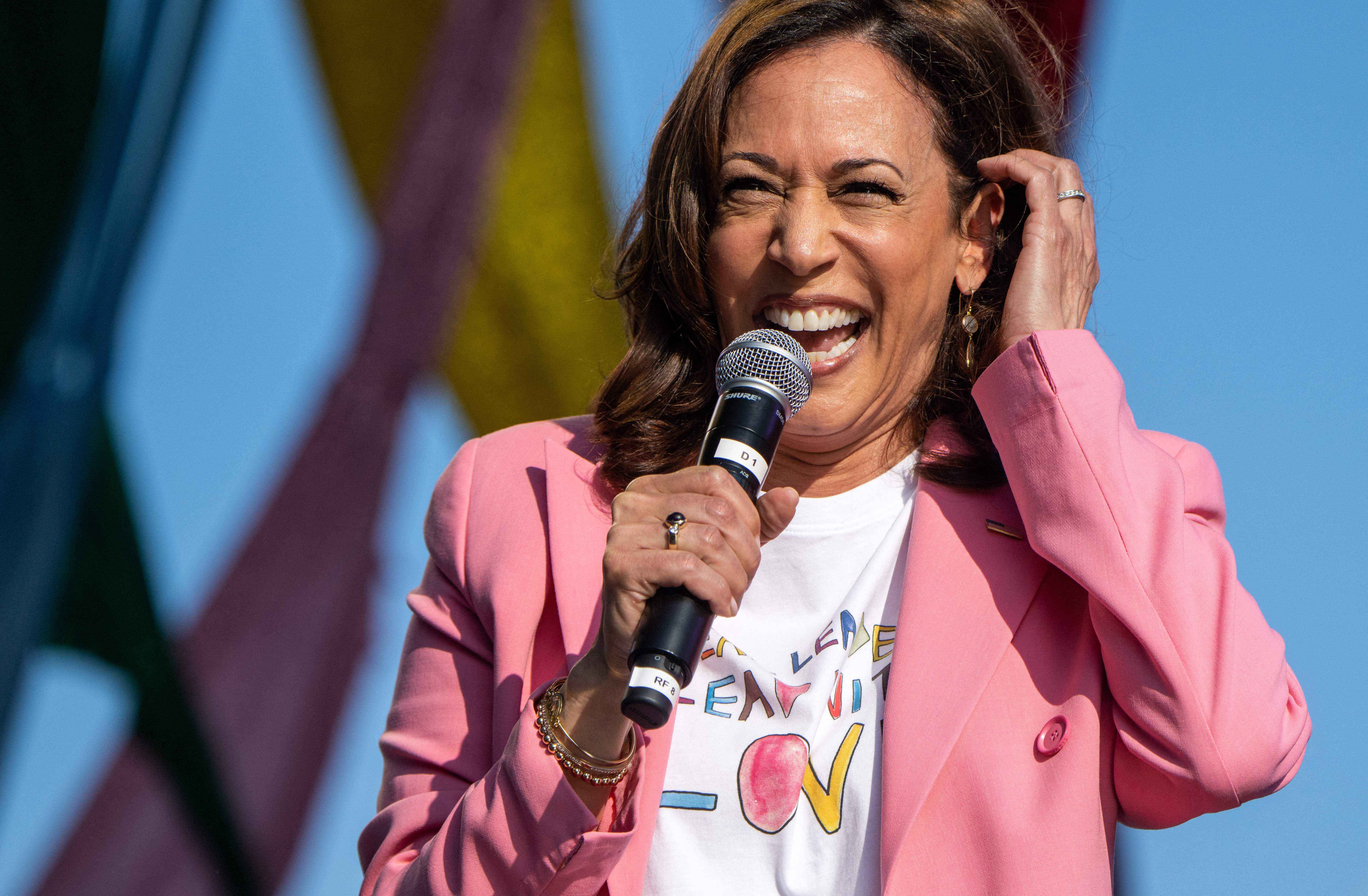
“It was really quite wonderful to see that. It was an acknowledgment of how far the community has come,” Mr Delia says.
Mr Maccubbin says the vice president’s appearance “was about time”. He’s been to a couple of Pride Day events at the White House, which they will have, he notes, “if it’s a Democratic president”.
“There’s a huge number of votes in the gay and lesbian community. It’s not just gay and lesbian people and transgender people. It’s the people who are part of their families. Their moms and their dads and their sisters, their brothers and their sons and their daughters,” he says. “There’s an awful lot of people that care, and they’re gonna vote the way they care.”
Speaking about his time working in the Clinton administration, Mr Delia says, “There was no way I wasn’t open … I worked in the White House for the first six months and then I went over to the Justice Department and worked there for the rest of the administration. And my late partner worked in the White House too … no one who knew us didn’t know that we were an openly gay couple”.
Before the anti-LGBT+ Defence of Marriage Act was signed into law by Mr Clinton in 1996, Mr Delia was able to share his “disapproval with the administration signing on to this” with Vice President Al Gore.
“He was in a tough place because I’m quite sure he didn’t believe in that nonsense either. I don’t believe that President Clinton did,” Mr Delia tells The Independent, adding that the bill was signed because of “political expediency”.
“It was sometimes tough with Don’t Ask, Don’t Tell and the Defense of Marriage Act. But we also understood that we were on a journey, and the journey sometimes has some rough patches and some rocky roads. And if you persevere, you’ll get beyond it. And in fact, we did. Both of those things have now been discarded,” Mr Delia notes.
The attorney says that the progress on LGBT+ rights has been “faster than expected”.
“There was much work done before the Stonewall riots in 1969. There was a tremendous amount of work done in the 50s and 60s, much of it goes unheralded because we’re able to point to a very notable event – the riots – as a seminal moment in the history of LGBTQ rights,” he adds.
“If you take it from the post-World War II era to where we are today, I’d say it’s been … very quick.”
Two massive parts of American society long thought to be unwelcoming to the LGBT+ community are religion and the armed forces.
While a group from the Washington National Cathedral took part in the DC parade for the first time in 2013, Mr Delia notes that “we have long had a very strong presence in the parade from members of the religious community”.
In 2014, an Armed Forces color guard led the parade through Washington – the first time in US history that an officially sanctioned guard took part in a Pride parade.
“We asked and it was granted,” Mr Delia says. “I happened to be marching right behind the color guard that year and it was extremely emotional to see that because I grew up in an era that was very much filled with homophobia and bigotry.”
“We heard from a lot of people in the wake of that … military veterans who had unfortunately been silenced during their years of service and they saw that and it touched a great emotion with them,” he adds.
Mr Delia joined the board of the Capital Alliance in 2008 as the group took over the organisation of Pride in DC from the Whitman Walker clinic, which had been brought in when the previous organisers “faltered”.
He says the clinic “needed to divest themselves of this because this really is not part of their core health mission”.
“They were calling for folks to step up, and a group of us who had been working on Pride through them had gotten together, and we formed the Capital Pride Alliance,” he recalls.
“We had them there for the first year in 2008, but then on in 2009 we were pretty much on our own,” he says, adding that it was “exciting” but “scary”.
When asked about the previous financial problems that have affected Capital Pride, Mr Delia says the alliance has been “very cognizant of the previous problems and have tried to avoid them”.
“We have a small staff. But we very much could not do this without the large cadre of volunteers we have,” he says.
It was announced in November last year that Washington, DC had been selected as the host of World Pride in 2025, which will coincide with the 50th anniversary of Mr Maccubbin’s block party marking the first Pride celebration in the US capital in 1975.
The DC celebrations will be the ninth World Pride after the first one was held in Rome in 2000. In 2019, about five million people attended World Pride in New York City, 50 years after the Stonewall Uprising.
“We really want to be able to showcase not only the LGBTQ+ community here in DC but throughout the United States,” Mr Delia says.
Join our commenting forum
Join thought-provoking conversations, follow other Independent readers and see their replies
Comments


Bookmark popover
Removed from bookmarks